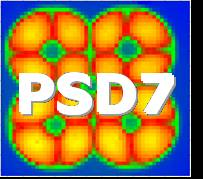Speaker
Mr
Atsushi Takada
(Kyoto University)
Description
A Micro Pixel Chamber, called “-PIC”, is a gaseous 2D imaging
detector with a fine pixel electrode based on the Printed Circuit
Board technology, and we developed it for the X/gamma-ray imaging
and the tracking of the charged particles [1]. The previous -PIC
has a fine position resolution (RMS ~120m), a high gas gain (Max
~15000), good gas gain uniformity (4.5% RMS) and the stable
operation (more than 1000 hour). But the detection area of the
previous -PIC (~10×10 cm2) is not large enough for a variety of the
application, for example an MeV gamma-ray Compton camera [2] and
dark matter search [3].
For these purpose, we developed a new -PIC having a ~30×30 cm2
detection area. The structure and the pitch of the electrode are
same as those of the previous -PIC. There are 768×768 pixels in the
whole area, and each pixel works as a proportional counter. The
anodes and the cathodes of the pixels are formed on the 768 anode
strips and the 768 cathode strips, which connect to the read-out
board with the wire bonding, and the anode strips are orthogonal to
the cathode strips. Therefore, this large -PIC is expected to have
a fine 2 dimensional position resolution same as the previous -PIC,
and the 9 times detection area. The yield of the first production
was about 50%, and there is only ~1% dead pixels in the whole area.
By these results, it is a prospect to the mass production of the -
PIC.
We started the test operation of this large -PIC at the beginning
of 2005, and we succeeded to detect the first signal with -ray of
90Sr/Y. This -PIC (SN041129-1) worked with a stable gas gain of
~3000 and a maximum gain of ~6000 at the center, and the ratio of
the gain was 2.2 between the minimum and the maximum gain area. An X-
ray image of 30×30cm2 was also taken by irradiating the X-rays from
109Cd (22keV) to the whole detection area. And, for more
applications, we are developing a time projection chamber with a
large volume (~30×30×30cm3).
In this presentation, we will report the manufacturing quality and
performance of the first large area -PIC, and we also present the
development of the readout system and a large size time projection
chamber for an application of the new -PIC.
References
[1] A. Ochi et al., Nucl. Instr. and Meth. A, vol. 478, pp. 196-
199, 2002; T. Nagayoshi et al., Nucl. Instr. and Meth. A, vol. 525,
pp. 20-27, 2004.
[2] T. Tanimori et al., New Astro. Rev., vol. 48, pp. 263-268,
2004.
[3] T. Tanimori et al., Phys. Lett. B, vol. 578, pp. 241-246,
2004.
Primary author
Mr
Atsushi Takada
(Kyoto University)




